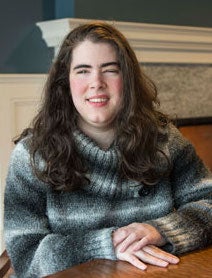Miranda Oakley

- Hometown: Wakefield, Rhode Island
- Major: English
- Graduation Year: 2016
Classes in Swan Hall were easy for graduating University of Rhode Island senior Miranda Oakley, while things were more difficult at the Chafee Social Science Center.
It wasn’t the subject matter of her classes that made things difficult, however. It was the geography and architecture of the buildings and their surrounding areas that made simply getting to class a challenge.
That’s because Oakley, a resident of Wakefield, was born completely blind.
Oakley faced many challenges on URI’s Kingston campus during her six years as an undergraduate in the Department of English, but the 27-year-old will become the first member of her family to receive an undergraduate degree from a university when she walks across the stage at Commencement on May 22.
“When I was in second grade, they told me I’d never go to college,” Oakley said. “I always knew I would go to college. Nothing in life is perfect and there are always going to be roadblocks, but I know that if I can do this, I can do anything.”
Perhaps the easiest part of education for most students – just showing up for class – was arguably the hardest part for Oakley. Each semester, Oakley had to familiarize herself with the Kingston Campus all over again, as she had to learn routes to all of her classes, in order, by finding reference points across campus that would help her navigate her way between buildings and classrooms.
She would spend weeks during summer and winter breaks trying to map out her class schedule with help from a state-appointed mobility instructor. The instructor would guide her across campus and through the buildings to her classrooms, helping her avoid obstacles such as doors, tables and desks that might be on the route. Oakley recorded voice instructions to use throughout the semester that indicated reference points such as a light pole or metal plate in the sidewalk.
“If I walk toward Swan, and I feel the lamp post on my right with my cane, I know it’s time to turn left,” she said.
As laborious as this process was, it was made even more frustrating when sometimes a classroom assignment would change just days before the start of the semester. Construction to exterior landscapes and building interiors also made navigation more difficult.
Her ability to reach her classrooms also depended on being dropped off in very specific spots on campus by the campus shuttle for students with disabilities, her mother, or her neighbor, Catherine Robinson, who is an ad hoc lecturer in the Department of Computer Science and Statistics. If they missed their mark by even a few feet, it added to Oakley’s difficulty.
“A lot of blind people stay away from URI because of the geography and the weather,” Oakley said. “Being located on a large hill, having to deal with snow and ice in the winter, it’s all very difficult. I don’t think people are aware of just how challenging simple things like getting to class can be for someone who is blind.”
It wasn’t much easier for her once she reached her classroom, as she often had to find ways to work around visual teaching tools that were often employed by professors. Graphs, in particular, posed a problem for Oakley, because they were not in Braille.
Oakley lived on campus three years, as well; a time she called the most difficult – and the most rewarding – of her life. She lived in Hutchinson Hall, which has a suite for students with disabilities, and struggled with loneliness and not being able to use the campus cafeterias because it was too difficult to get around.
“I had a kitchen in my room, so I ate by myself all the time,” Oakley said. “Even my friends who would see my room didn’t understand. They’d say, ‘That’s great that you get your own kitchen,’ or they’d see my picture of me standing with Taylor Swift and say, ‘Jealous!’ They didn’t understand how difficult every day can be.”
But, yet, Oakley persevered. She made friends, she adjusted to each new challenge, she worked with readers – fellow students who would help her read the class materials that were not provided in braille – to help her complete her classwork.
She advocated for the installation of new railings outside Hutchinson Hall to help keep her and other students with disabilities safe. She often communicated with URI’s Disability Services to tell them the challenges she faced, such as getting dropped off in the wrong spot, or the need for more readers.
“I have to use my experience here to talk about what’s great about the university, but also the flaws,” she said. “I only know how to be honest, and if I don’t speak about these things, it would be a disservice to other blind students who come here after me.”
Oakley hopes to continue advocating for the blind after graduation, likely through her writing. The English major also earned a minor in communications and she hopes to one day write a book. She also plans to maintain a blog, and she hopes to be self-employed.
“The unemployment rate among the blind is so high it’s scary,” she said. “But I believe I should have a job, and I think writing is where I see myself earning a living. I want to raise the bar for myself and for others. I’m passionate about advocacy and URI has fueled that passion for me.”
Media Contact: Brian Pernicone, 401-874-7245
URI Photo by Nora Lewis

